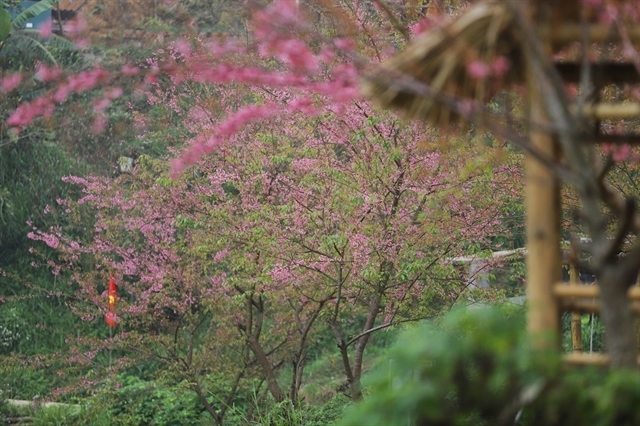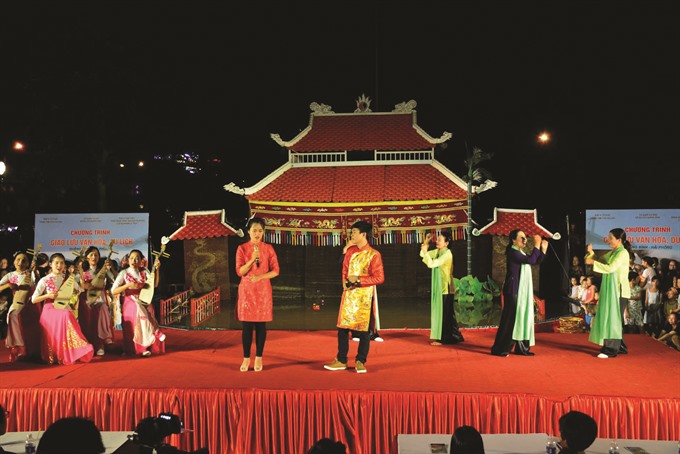 Features
Features

Generations ago, residents of Lệ Thủy District in the central province of Quảng Bình developed unique chants to serve as the soundtrack to labour in the fields and at sea. Now, their descendants are fighting to safeguard the tradition. Phương Hà reports
 |
| The Lệ Thủy chanting was recognised as national intangible cultural heritage by the Ministry of Culture, Sports and Tourism.https://www.quangbinhtourism.vn |
Generations ago, residents of Lệ Thủy District in the central province of Quảng Bình developed unique chants to serve as the soundtrack to labour in the fields and at sea. Now, their descendants are fighting to safeguard the tradition. Phương Hà reports
One year after it was honoured as a national intangible cultural heritage, Lệ Thủy chanting is expanding and reaching larger audiences. But the work of preserving and promoting the heritage is still difficult.
The performance introducing the Lệ Thủy chanting, a genre of Vietnamese folk music from Lệ Thủy District (Quảng Bình Province), at the Hall of the Union of Literature and Art Associations in Hà Nội on May 25 attracted a large number of spectators. People were excited to encounter Lệ Thủy chanting, some of them for the first time.
The show began with hò lia trâu, a type of folk singing consisting of six tunes, performed by a group of Lệ Thủy chanting club artists. The song brings out the tunes familiar to working people, sometimes witty and other times full of happiness and excitement, winning love from the audience.
Nguyễn Thị Lý, president of the Lệ Thủy club, said that the club travelled from the central province of Quảng Bình to Hà Nội to perform at the invitation of cultural researcher Nguyễn Hùng Vĩ and the Association of Vietnamese Folklorists in Hà Nội. “We are happy to have a chance to introduce our heritage to many people,” she said.
According to researcher Vĩ, the founding and developing process of Lệ Thủy chanting aligns with the process of the overall development of the people in Lệ Thủy. Previously, Lệ Thủy chants were sung by lumberjacks, peasants and fishermen as they were doing their work.
During the time of war in Việt Nam, Lệ Thủy chants were sung to encourage the people transporting food and weapons. In peacetime, the chants were performed on stage to bring a unique musical art to audiences.
Vĩ said that the uniqueness of the chants came from the differences in the special categories of chants, each sung during a different working activity.
Struggles in protecting heritage
With its cultural value and uniqueness, the Lệ Thủy chanting was recognised as national intangible cultural heritage by the Ministry of Culture, Sports and Tourism. But it still hasn’t had much of a chance to reach a national audience.
There have been a few activities to introduce and promote Lệ Thủy chants, through Bình Trị Thiên folk-song festivals, cultural events and television programmes. But the artists don’t have a regular stage on which to perform this art and introduce the heritage to people.
The representative of the Quảng Bình Department of Culture, Sports and Tourism admitted that it was difficult to win the honour for Lệ Thủy chants, but even harder to then preserve and develop the value of this national heritage.
Researcher Vĩ and his colleagues who share his love for the art form have accompanied the club to perform in provinces from Hà Nội and Bắc Ninh to Nam Định, Nghệ An, Hà Tĩnh and Phú Yên. However, these activities are infrequent and therefore haven’t reached many people.
With the strong wish to protect their ancestors’ legacy, the president of the Lệ Thủy chant club, Nguyễn Thị Lý, said efforts to preserve the art form were critical. After she established the Lệ Thủy chanting club in 2015, she and the members of the club have rehearsed, collected songs and performed to introduce the chants around the country.
The members of the club also teach young artists how to sing the Lệ Thủy chants. Artist Lý said that she wanted the club to have a stable funding source so that members could travel to perform in different places, spreading the heritage to more and more people.
“Other than funding, we also want the authorities and organisations to provide us more events in which to participate, such as contests and classes to teach the folk music to the young generation,” Lý said. — VNS




